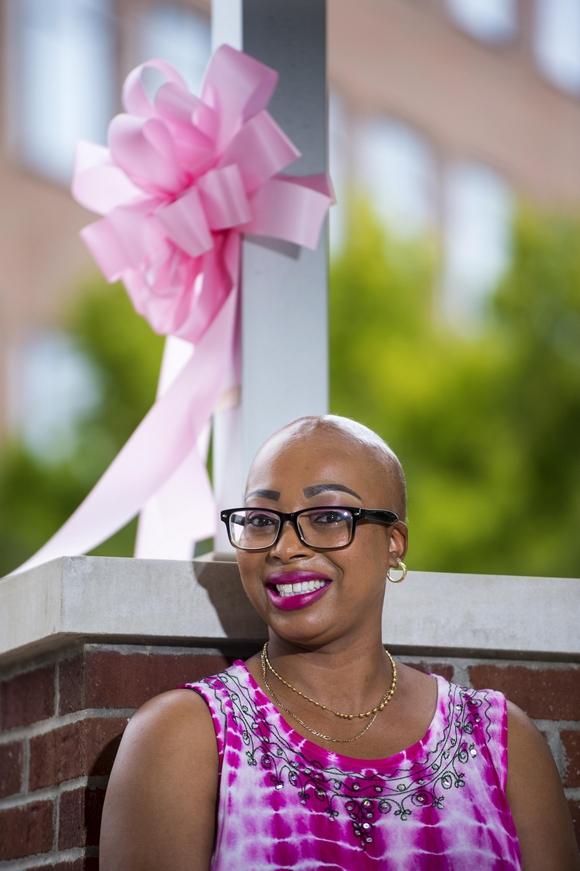Breast cancer costs are hardship for many Augusta patients
Fighting breast cancer can create a financial burden that many patients say is a severe problem.
Tandy Duty knew there was something wrong earlier this year when a marble-sized lump in her right breast grew to the size of a gumball in a month.
“It was growing pretty fast,” she said.
Still, it was a shock when the 40-year-old mother of two got the call April 29 that she had breast cancer. That it was also in the midst of a COVID-19 pandemic when she would lose her job just added to it.
“You picked a hell of a time to get breast cancer,” her surgeon told her.
She also was not prepared to bear the cost of treatment, chemotherapy, scans and doctor’s visits on top of taking care of two young children, paying for rent and utilities and buying groceries.
“All of this stuff costs money,” Duty said. “It was just one thing after another after another.”
She is not alone in facing financial hardship because of her breast cancer treatment. A new study of 164 women treated at AU Health System and the Georgia Cancer Center found that 65.8%, nearly two-thirds, said the costs or financial burden of treatment and daily expenses were a problem. Among them, 8.6% said the cost of taking care of the family had become a severe problem, 14.4% said medical costs were a severe problems and 8.4% said they had no money to pay for medications or co-payments.
“We found a sizable percentage were having difficulty meeting their household expenses and that more of the women were experiencing difficulty paying out of pocket expenses like co-payments for medications or for doctors’ visits,” said Dr. Steven Coughlin, the interim chief of the Division of Epidemiology in the Department of Population Health Sciences at Augusta University.
Those young women like Duty and those with lower incomes were more likely to face greater financial burdens because they might be taking care of children, going to school or having to miss work to get treated, he said.
Part of it is also a consequence of greater success in treating breast cancer, said Dr. Jorge Cortes, the director of the Georgia Cancer Center.
“The treatment options and the approach and the understanding of cancer has improved dramatically. But the problem is that it has made it in many instances much more difficult for the patients (to afford),” he said. “Certainly, the cost of the drugs is an important one, but it’s other things as well: anything from transportation to taking care of their families, missing work and things like that. All of this adds up.”
When faced with hard choices, some patients might feel they do not have an option to continue treatment, Coughlin said.
“Studies have shown that some cancer patients delay treatment or don’t adhere with certain treatment recommendations because of the cost,” he said.
That only makes things worse, Cortes said.
“The later you treat, the worse your outcome and usually the more complex your treatment becomes,” he said.
It also becomes more expensive. A 2016 study found that treating the earliest stage of breast cancer averaged around $60,637 vs. $182,655 for late stage cancer.
“Usually you have to use more aggressive therapy, more combinations of therapies, things like that that makes it more costly,” Cortes said. “Then it ends up being an even worse problem in all aspects.”
It’s one reason the cancer center has social workers and nurse practitioners who can talk to patients about the potential costs and sources of financial assistance, from public programs to private foundations.
“There are resources out there to help patients,” Coughlin said.
But Duty said no one talked to her about the costs when she was initially referred to Doctors Hospital of Augusta for treatment. The Army veteran has also gone for treatment at Dwight D. Eisenhower Army Medical Center. It wasn’t until she began getting bills for $9,000 at a time that it hit her. Fortunately, insurance covered most of it, but it couldn’t help with all of the other expenses.
“You always think insurance is going to take care of everything,” Duty said. “But it adds up really fast.”
She was recently left wondering how she was going to pay a $190 utility bill that was past due. Fortunately, Duty received a referral to the Lydia Project, which helped her cover it.
Now at the cancer center for her care, and still facing a tough prognosis, she is determined to keep going no matter the cost. Duty has her daughter, Nevaeh, 4, and Brysen, 2, to remind her of what is at stake.
“I’m going to fight,” she said. “I’m going to do what I need to do. I’ve got to do this for them.”
Source: The Augusta Chronicle By: Tom Corwin
Support families fighting financial toxicity of cancer –here
